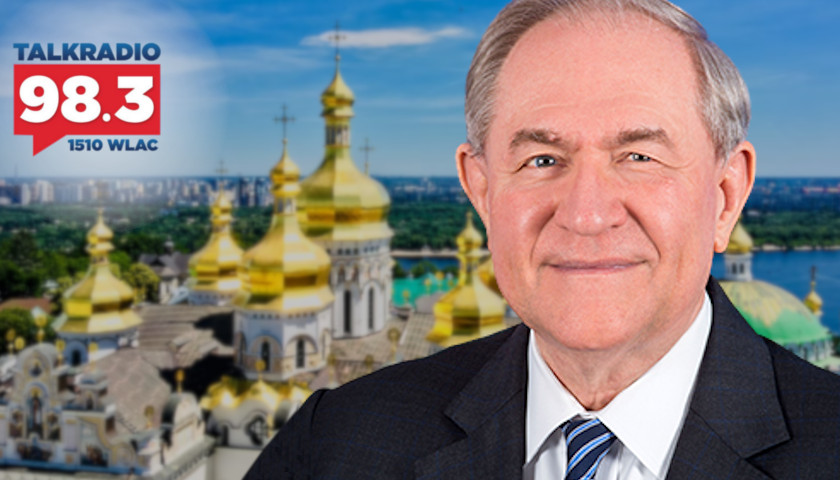Live from Music Row Thursday morning on The Tennessee Star Report with Michael Patrick Leahy – broadcast on Nashville’s Talk Radio 98.3 and 1510 WLAC weekdays from 5:00 a.m. to 8:00 a.m. – official guest host Aaron Gulbransen welcomed former Trump-appointed Ambassador to the Organization for Security and Co-operation in Europe (OSCE) Jim Gilmore to the newsmaker line to update listeners on the current situation between Russia and Ukraine.
Gulbransen: On our newsmaker line, we have probably the greatest governor that Virginia ever had and the Trump-appointed ambassador to the Organization for Security and Co-operation in Europe, Jim Gilmore. How are you, sir?
Gilmore: Good morning, Aaron. Good morning to all your listeners in Tennessee and beyond, I guess.
Gulbransen: Yes. We’ve got quite the following, sir. We’re seeing gun-related stuff all over the news. And I’m not sure that people are quite as up on Ukraine, but that is your area of expertise. So can you just tell us what’s happened in the last week or so in Ukraine and what’s been going on?
Gilmore: I know that your listeners follow it somewhat, but Vladimir Putin’s theory – and the game has always been to conduct a conquest here and to take over Ukraine and to make that the first essential building block, and reassembling the old Russian Empire, and I think that your listeners have to always ask the question, do we matter?
Does it matter to us? Do we care? And I think the short answer, as a guy who was a soldier during the Cold War and assigned to West Germany during the Cold War, I can tell you that it does matter.
Europe’s independence and sovereignty matters. It has to remain independent and sovereign if the United States is to remain safe. So I believe that it does matter. And I believe that Putin’s efforts are a big-picture difference.
Now, of course, your listeners can look at the tactical stuff, stuff that’s going on every day on the battlefield. And that’s newsworthy.
And what’s going on right now is that the first Russian attack on the capital and attempt to take over the whole country of Ukraine, as I just said, failed because the Ukrainian Army, frankly, heroically decided it was going to fight for its independence and its sovereignty.
But then they dropped back and they said, okay, in that case, we’ll just go ahead and attack from the area we already control, which is this Donbas, Eastern Ukraine area, and we’ll expand it from there.
That’s the battle that’s going on right now. It’s an artillery battle. The Russian practice is to use long-range artillery to pulverize everything in front of its army and then to march the army in.
The only way that the Ukrainians can resist that is with their own long-term artillery of rockets. And now the United States and the Western allies are starting to supply that, but it hasn’t completely reached the battlefield yet.
So it’s a little bit of, the actual battle for Ukraine is still in doubt, but the Russians are trying to grind them down. This war of attrition is one that I think is very dangerous for the Ukrainians. So that’s my summary of the big picture.
Gulbransen: What do you expect is the next step the United States will take?
Gilmore: I think the U.S. is now planning to send long-term rockets, long-range rockets together with long-range artillery step-by-step, where we’ve been increasing the support to Ukraine, as well as the Germans, the British – who have been magnificent, by the way – and the other Western allies.
The Eastern allies are the ones you want to watch. They’re the ones that are most in danger from a Russian triumph, because if the Russians triumph, then they begin to put, at least, political pressure on those Eastern European countries that used to be part of the Soviet Empire.
And as I want to repeat to your listeners, the subjugation of Eastern Europe and really all of Europe is possible.
Brewer: Governor, this is Clint Brewer. Question for you about Russia and its resources: The Russian Army, whether it’s been the Soviet Army or prior iterations, it’s always been largely about conscription.
They’re not always the most bought-in soldiers to the cause. And there’s been some instances where the Ukrainians have been able to drive them out of key cities, actually beat them back because they’re defending their country.
How long can Russia sustain this? How long can Putin’s army sustain this before their will just clearly is not there or before their numbers are not there?
Gilmore: Well, that’s, of course, the argument, the question about what’s going on. Putin depended upon a quick victory. And in fact, the United States was sending that message at the beginning of the war that there was going to be a quick victory by the Russians.
And the Ukrainians said, well, just wait just a minute. We’ll see about that. And they’re now fighting for their independence and their sovereignty, and they have lost thousands upon thousands of people.
Let’s remember that these aren’t just numbers on a list. These are fathers and brothers and uncles who have given their lives for Ukrainian independence. And that means they have a big stake in this war.
Now, as for the Russians, on the other hand, they don’t have really a stake in this. There’s a lie going on that says that Ukrainians are Nazis. That’s just nonsense. The only people who are behaving like Nazis here are the fascist aggressors coming out of Moscow.
So sooner or later, the Russian people, who are losing people too, are going to wake up and say, wait a minute, what’s this all really all about? Ukraine is really not a threat to us. What’s this all about?
And so political and policy and messaging victories are important in this. But, direct to your point, the Russians are losing people too.
And the question is, how long can this go on? And the answer is it can go on for a while because some conscripts will fight and some won’t. The ones that won’t will be dealt with another way by the Russians and the ones that will will be used for this war.
Gulbransen: I’m always curious on these matters. Do you buy the intelligence that says that Putin was here and I think it was April, and that he was being treated – and I could be getting the date wrong but he’s being treated for cancer, and does his grip on power seem to be tenuous, and is this an attempt to increase it or save face? It’s an interesting question.
Gilmore: Well, we really don’t know whether he’s got cancer and dying or not. There have been these rumors, but I would be cautious against all these rumors that go around in the Western press that say, well, he has cancer, well, the conscripts won’t fight, well, the Russian Army is going to collapse. They’re playing a big game here. They’re playing a big game. The reassembly of the Russian Empire, which means that they have political sway over Europe, is their ultimate objective.
And that’s as significant as Stalin or Peter the Great whose, I think, birthday they just celebrated, by the way. That’s what Putin is doing.
He’s trying to make his place in history by once again raising Russia up from being basically just another European country to be one of the dominant powers on the earth.
And the question is, does that matter to the United States, and as a guy that’s seen all this before I think it does matter. It does matter to the people of this country.
I keep hearing stories well, we shouldn’t be sending this money. We should be spending the money on something else. Well, the United States is just going to have to do what it has to do to protect its safety. And of course, the next question is, well, this doesn’t have anything to do with American safety, and I assert to you that it does.
This is a long-term deal here, and we can get into a much larger war that’s much more expensive and costs American lives, and we don’t want to do that. If we now have an ally that’s willing to fight for itself, we ought to remember that.
Listen to the interview:
– – –
Tune in weekdays from 5:00 – 8:00 a.m. to The Tennessee Star Report with Michael Patrick Leahy on Talk Radio 98.3 FM WLAC 1510. Listen online at iHeart Radio.





